Biafra – A History (Part III – V)
“As I have said before, and I repeat, the war we are fighting is an imperialist war, waged by Britain and Russia in an unholy alliance and with the tacit acquiescence of the United States, and fought by proxy.”
“I see Biafra as a bastion of the free in an age in which freedom and self-determination are conditioned by the color of the skin. I would go further to say that for the acceptance of the black race, there must be a Biafra. If this Biafra is stifled, then perhaps in the future another will emerge.”
— Chukwuemeka Odumegwu-Ojukwu (Radio Biafra broadcasts; November/December; 1968)
By August of 1967, Biafra had been forced to withdraw from the occupied territories in Nigeria gained during its incursions in July and August. Back behind its original borders, Ojukwu could do nothing to prevent the destruction of most of his air force by the new Nigerian MiGs. By September, three Nigerian regiments had crossed the Niger into Biafra. With the abandonment of the capitol at Enugu for the inland city of Umuahia in September, 1967, Biafra was effectively on the defensive.
______________________________
Biafran soldier w/captured Nigerian equipment; 1968)
______________________________
Now, his forces spread thin (augmented by European volunteers and mercenaries committed to his cause of freedom), Ojukwu had to make the choice between losing his country, and losing his one deep-water port, Port Harcourt, in the south of Biafra.
Port Harcourt is on the shores of the Bight of Biafra, which in turn is part of the Atlantic Ocean. One of the world’s largest river-deltas, the Niger River delta comprises the gateway to Port Harcourt, and is a natural ‘staging area’ for the large numbers of ships which come to Port Harcourt every day, bringing supplies to Biafra, as well as taking the oil which was such a vital part of the Biafran economy.
Ojukwu’s dilemma was plain – with the pressure of Nigerian troop-columns threatening his capital, he had to maintain sufficient forces in the field in western Biafra to counter this threat – but he also had to maintain Port Harcourt at all costs, defending the city while it was under siege.
He chose to fight a delaying-action, surrendering over 150 miles of territory as the Nigerian army pushed east, but holding the coast-district against the onslaught of Nigerian artillery and Egyptian/British-flown MiGs and Ilushin bombers. Savage fighting continued through most of the fall and winter of 1967-1968. Reinforced by additional mercenaries, volunteers, and Biafran regulars, the Biafran army managed to hold out through most of spring, 1968.
All the while, Biafrans were starving.
_____________________________
(Biafran children, in late-stages of starvation; 1968)
_____________________________
“By the beginning of April, 1968, the truth about Biafra and the genocide being perpetrated by Nigerians was filtering in increasing volume to the outside world,” said President Ojukwu in a broadcast over Radio Biafra in the summer of 1968. In truth, the Biafran famine was far worse than the media presented.
By this time, the failure of harvest (Nigeria had occupied most of the Biafran farmland close to the border near the Niger River) and the war itself was claiming 50,000 Biafran lives monthly.
Barring a miracle, Biafra was on borrowed time.
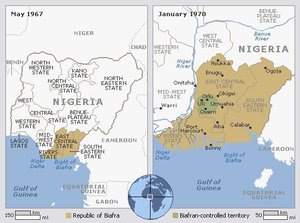 (Map of the Republic of Biafra — 1967 – 1970)
(Map of the Republic of Biafra — 1967 – 1970)
“For nearly ten months now, we have been fighting a hard and bitter war in defense of our lives and property and the future of our children against Nigeria’s calculated war of destruction and genocide. The immediate tragic circumstances which culminated in this war are well known to all of us….”
— President Chukwuemeka Odumegwu-Ojukwu; broadcast of 31 March; 1968
“In Africa, a thing can be true at first light, and a lie by noon.”
— Ernest Hemingway
On 12 May, 1968, fifty thousand troops of the Nigerian Third Marine Commando under General Adekunle and his second-in-command, General Obasanjo, made an amphibious landing south of the Biafran city of Port Harcourt in the Niger River delta. At the same time, the Nigerian Air Force stepped up its bombing raids on Port Harcourt, attacking the outer-ring of Port Harcourt’s defenses round-the-clock.
Over fifty thousand Nigerian regulars, mainly Hausa troops from the north with no love for the Igbo, were chosen to assault the land-based defenses to the west of the city. The outcome left little in doubt.
Toward the end, broadcasts from Radio Biafra grew strident in its pleas for military, medical, and United Nations assistance. Biafran troops, out of ammunition, threw gasoline bombs on advancing Nigerian troop-carriers and fought hand-to-hand with fixed bayonets as the Nigerian troops pushed deeper into the city.
On 23 May, 1968, Port Harcourt fell.
______________________________
(Biafran soldier with French-made machine gun on hood of Land Rover – Part of Port Harcourt burning in background – 1968)
______________________________
Four brigades (about 20,000 effectives) of Biafran troops streamed through the now-chaotic city northward toward the city of Owerri to make what might be a final stand.
General Adekunle, commander of the Third Marine Commando (Nigerian Army), simply let his mainly-Hausa troops have the run of the city for nearly a week.
Bayoneting anyone who resisted, the Third Marines engaged in a chaotic ‘suppression’ of the Port Harcourt population, raping women at will, murdering their husbands and children, and looting with abandon.
Entering the Port Harcourt hospital, they bayoneted the wounded Biafran soldiers who could not evacuate, as well as the physicians who stayed behind; raped nurses and new mothers in the maternity wards, looted all medical supplies, and eventually returned to their units.
This complete breakdown in discipline on the part of Nigerian Third Marine Commando bought the remnants of the Biafran defenders badly-needed time to establish their perimeters around Owerri – but at a civilian cost of over 50,000 Biafran lives during the week-long orgy of murder, looting, and rape in Port Harcourt.
Biafra had lost its one deep-water port capable of bringing supplies to the nation via the sea. It had also lost its major population center, plus the oil resources so badly needed to fuel its economy.
In August, over 2,000 short-range rockets and millions of rounds of badly-needed ammunition began arriving at the airfield near Owerri. At the same time, the OAU (Organization of African Unity) began to lobby the international community for aid.
Ojukwu has long been criticized for his rejection of land-haulage for food-aid – however, there is a long –standing west African tradition of using poison to eliminate one’s enemies, and an equally-long tradition of failing to differentiate between civilian and military personnel in this endeavor; it may well be that the Biafran government wanted to prevent this possibility.
Ojukwu demanded airlift-only as a means of resupply; it’s often been suggested that he wanted this method so he could fly in arms along with food supplies; however, there’s little practical evidence that this occurred.
What is known is this – by the end of 1968, over 200,000 Biafrans were dying monthly, due to the Nigerian blockade of all road-entries to Biafra, plus the crowding of Biafra’s population into a land-area a little less than one-half of the original size of the nation.
Contacted repeatedly by the Biafran foreign-office in Lisbon, Portugal, the United States was content to do nothing, either to support a nation seeking its independence, or to provide material relief for the Biafran civilian population.
Reinforced by fresh volunteers and French munitions, the Biafran army went on a counter-offensive in October of 1968. This resulted in large numbers of Nigerian army casualties along with the capture of Owerri by the Biafran army, but eventually resulted in a stalemate by spring of 1969 as the Biafrans ran out of ammunition, food and other supplies.
______________________________
(Biafran refugees leaving Owerri; May, 1968)
______________________________
Airlift of arms and supplies were neither enough nor of any frequency to sustain the life of the population nor the viability of the army. What followed – from early 1969 until the end – is a shameful chapter in modern history.
Nigeria, with the tacit agreement of the international community and with the active support of Great Britain and the Soviet Union, having squeezed the population of Biafra into an area around half its original size, was allowed to simply starve Biafra into submission. During 1969, Biafrans died daily at a horrendous rate. At the peak of Biafra’s suffering, it’s been estimated that nearly 250,000 Biafrans were dying monthly.
On 22 December, 1969, the Gowon government launched its final offensive. Starving; Biafran troops could do no more. They simply threw down their weapons and faded into the jungle. Nigerian columns advanced unopposed, cutting Biafra in two and rendering the nation indefensible and the situation hopeless. Nigerian troops began a systematic process of killing every male over the age of ten, raping and mutilating the women of childbearing-age, and destroying anything that might be of value.
________________________________
(Biafran folk-art painting of Nigerian troops raiding Biafran village – 1970)
________________________________
On 13 January, 1970, President Ojukwu fled with most of the Biafran government to Abidjan in the Ivory Coast. The remainder of the Biafran army capitulated later that day.
The war for Biafran independence — which held such promise both for the region and the world — was over.
“Blockaded and besieged, we had no alternative but to cry out as loud as we could, so that, should we perish, somewhere, some people in the world, men of good will, would at least record the fact that at one time we did exist.
May I take this opportunity to thank all those persons and organizations that have sacrificed that we might live – that we assure them that their sacrifice will not have been in vain.
Biafra lives. The struggle continues. Long live the Republic of Biafra.”
— Chukwuemeka Odumegwu-Ojukwu (President; Biafra – broadcast-from-exile; January, 1970)
“The world is a fine place, and worth fighting for.”
— Ernest Hemingway
As an apologetic for Nigerian statehood, Biafra stood in sharp contrast to the artificiality of Nigeria. Biafra was the proof-made-manifest that political-constructs using arbitrary borders do not work in regions where familial and tribal affiliations hold sway.
These lessons were learned in Biafra, as they were to be learned later in Yugoslavia in the 1990’s, and in Iraq in present day.
Biafra was also proof that the definition of genocide is very much determined by money, power and skin color – nearly the same number of ethnic Igbos were killed between 1967-1970 as the number of Jewish people during the events in Europe between 1937-1945 – but Biafra was denied support for its nationhood and any form of United Nations-sponsored peacekeeping or aid relief.
The expected reprisals after the fall of Biafra never occurred, largely due to pressure from both the British and U.S. governments to end the war quietly – it was believed that there was still a danger of Biafra rising again due to popular support if the Gowon government completed its genocide. As a result, the entire war, along with its atrocities, were metaphorically ‘swept under the rug’ by the international community.
Tactically, the war was lost in September, 1967, when the original capital at Enugu was lost and Biafra went over to a defensive posture.
Strategically, the war was lost when Port Harcourt fell, and in spite of the recognition of Biafra by several west African states at that time, those recognitions did little to enhance Biafra’s stance in the eyes of the rest of the world. Deprived of its only deep-water port, its oil-reserves, half of its land-area and nearly all of its arable land, and with its population concentrated together in a manner which invited disease along with starvation, the question most people ask is “why did Ojukwu attempt to hold Biafra together, when there was little hope of winning?”
The answer is plainly obvious to most of us who’ve studied the phenomenon in any depth – given the alternative between an uncertain future at the hands of a known enemy, and a certain future – even death- with one’s ‘own’ – a person will choose the familiar over the unfamiliar; the miserable company of one’s own people over the ill-treatment of foreigners.
Statistics:
— Exact numbers are not possible after this time, but numbers between 2,000,000 and upward of 5,000,000 Biafrans dead of starvation, disease, and direct military action (wounds) during the war have been suggested.
— While reprisals never materialized after Biafra’s capitulation, the Igbo continue to be repressed. Many have left their homeland for more-peaceful lives in Great Britain, Canada, and the United States, where their talents are more welcome.
— The land east of the Niger River has never fully recovered from the thirty months of war which marked the existence of the Biafran Republic. To this day, the Igbo are persecuted.
— The United States government has never admitted any failure surrounding the events in Biafra from 1967-1970. To this date, the U.S. has no foreign policy which adequately addresses Africa.
— Nigeria continues to suffer from the effects of military dictatorship and corruption to this day.
Personalities:
— President Ojukwu returned from exile in 1980 to the acclaim of over a million people who lined the Owerri airport to welcome him home. He lives quietly in Nnewe, in eastern Nigeria.
— President Gowon saw a brief transition to democracy, then a descent into more chaotic military dictatorships, being overthrown in a coup in 1975. He lives comfortably today in Lagos, Nigeria. He was never called to account for his responsibility regarding the genocide in Biafra.
— General Murtala Mohammed was never called to answer for his crimes against humanity or genocide against Biafra. The international airport in Lagos is named after him. He was installed by coup as Gowon’s replacement in 1975; his rule was cut short in another coup attempt in 1976, when his limousine was ambushed in Lagos traffic.
— Neither General Adekunle nor General Obasanjo (the two architects of the Biafran genocide-by-starvation) were held accountable for their crimes. In fact, Adekunle said, “I want to prevent even one Igbo having one piece to eat before their capitulation,” in response to a question regarding his strategy. Adekunle now lives in retirement, and has recently published a memoir; Obasanjo is the current president of Nigeria.
________________________
On an academic level, I’d be remiss if I didn’t say I’d never have been able to complete either my masters’ thesis in college or this small series if the good people at Harper; Row hadn’t had the courage to publish the collected thoughts and speeches of President Ojukwu in their fine book “Biafra”, released in 1969. I’ve had a first-edition for many years; it survived my housefire and is a book I’ve read several times since I bought it for $1.50 at the used-book sale in college.
Fredrick Forsyth’s book, “The Biafra Story” contributed greatly to my understanding of the conflict.
There is much which was left out of this story for clarity’s sake – the miniCOIN Airforce of Swedish Count vonRosen makes for a grand tale; the memoirs of Rolf Steiner, the mercenary officer from Germany, also offered invaluable perspective.
I’m also indebted to the website Biafraland.Com, which provides much in the way of anecdotal material and other information about the land to the east of the Niger.
____________________________
On a personal level – when Biafra seceded from Nigeria, I was 12 years old. While other boys were out playing softball, a combination of personal interest and a touch of asthma kept me indoors, either reading or listening to my shortwave radio (a gift from Dad – he told me he’d give me his old Zenith when he knew I’d use it).
I had followed the problems in Nigeria, right along with the war in Vietnam, the Six-Day War in the Middle East, and (later) the invasion of Czechoslovakia by the Soviet Union.
Upon Biafra’s secession, I thought – ‘these people are in the right – the U.S. will have to do something for them!” I put a map of Nigeria on my wall, and followed the troop-movements, gleaned from broadcasts and magazine clippings.
I asked my Dad when he thought the Biafrans would win. He said, “Actually, son, I think they’re going to lose this one.” I was crestfallen. They were a new nation; certainly deserving of freedom.
I was 12 then. I had much to learn.
____________________________
References:
Surviving in Biafra: The Story of the Nigerian Civil War (Alfred Obiora Uzokwe; 2003) Writers’ Advantage Press
The Biafra Story (Frederick Forsyth; 1969; 2001) – Cooper Press; UK
The Selected Speeches of Lt. Col. Ojukwu (Biafran Govt. Press; Onitsha, Biafra – 1967)
War Stories – A Memoir of Nigeria and Biafra (John Sherman; 2002) Mesa Verde Press
Shadows – Airlift and Airwar in Biafra and Nigeria, 1967-’70 (Michael Draper; Hikoki Press; 1999)
The Last Adventurer (Rolf Steiner; Boston/Little/Brown Press; 1978)
American Policy and African Famine: The Nigeria-Biafra War, 1966-1970
Biafra (President Chukwuemeka Odumegwu-Ojukwu; Harper and Row; 1969)

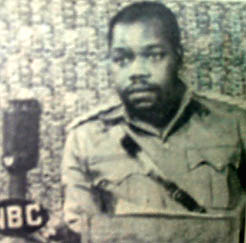
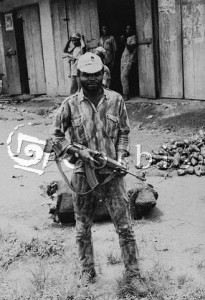
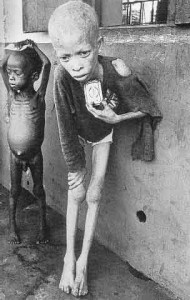
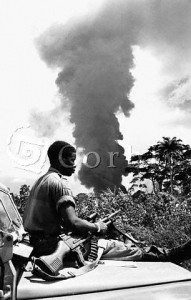
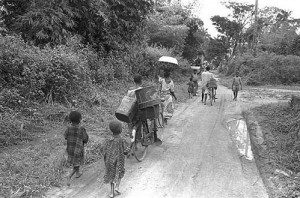
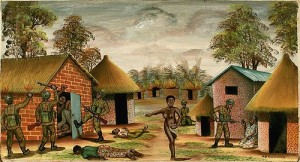
Astra, thank you very much for this coverage of a time period we should never forget, but that seems determined to be placed into the Orwell shredder. One of the things that disturbed me in the very beginning of this piece is that your description of the Igbo placed them among the more intellectually advanced of the Nigerian state. It brought to rusty memory, the terrible genocide against the intellectuals of Cambodia; also within the same time frame, and i shuddered to think of the significance of such target areas. If the Igbo had been a worker’s community, simply expressing the rights to fair labor practices, the genocide would have been as horrible, and i would be as deeply disturbed, but when a Nation turns on its intellectuals, there is something irreparably wrong with the fabric of that society. The intellectuals are the ones who design the commodities of civilization, its technology, its progressive development in domestic and International affairs. They are not always morally right; corrupt ethics can be practiced at any stage of intelligence; but without intellectual input, there can be no outstanding achievements within the arts, sciences or mathematics. So then, of course, the question would be, what earthly purpose could be gained by allowing such a massive squandering of human resources, and the answer, i would leave to a person’s own speculations.
The one thing which cannot be taken from a person is his/her intellectual capacity — brainpower; if you will.
Smart people have been universally despised by the majority all throughout history – the examples are such that they really don’t need to be reiterated.
When you add the religious component to the issue, then the real question becomes not ‘why?’ but ‘why did the entire world ignore the inevitable?’
Humanity has the habit of seeing the obvious, and acting against it in spite of all logic. Squandering human potential is only part of the issue.
Karla you raised questions and concerns that I always have have about over intellectualizing. While I value intellectuals I see where sometimes when on the track of figuring something out, people tend to get so introspective as to loose sight of the whole. Being intellectual does not make people morally correct. A case could be made for this in many areas of science. Too often the concern is can this be done, not should this? That is not to say intellectuals are without morals, but rather it is very often not until the problem is solved( in their minds) and they lift their heads up that they see what consequences the answers carry.
There must be balance because everyone must have a place in a community or as Astra pointed out the inevitable will occur.
Many of the intellectuals, especially in writing academics, were hated in Nazi Germany as well, and had to move to move to safer areas like Switzerland or Sweden. However, Hitler was still able to assemble an association of medical doctors and scientists who performed atrocious experiments on their victims in the name of advancing medical and scientific knowledge of the human anatomy, pain, chemical, radiation and disease thresholds, and creating a map of the human mind. The degree of your intelligence doesn’t automatically make you an expert on moral or ethical decisions. That moral compass shifts in accordance with how much a person is willing to let go of comfortable beliefs when those beliefs don’t correspond with an internal digest of right and wrong. There is nothing more uncomfortable to the intelligent and cunning who promote wrong-doing, than a person of equal intelligence (or greater) striking an emotional response in the citizens who had already been questioning the morality of their hero on a subliminal level. Once the words have been articulated, the question can no longer be ignored.
My point however, in eliminating the intellectual society from its rank, or discrediting it, is that the society begins to stagnate into constant inner turmoil, dictatorial decision making, and few advances in the arts and sciences. The society fails to develop the earmarks of an advanced and affluent civilization. It falls eventually into ruin and decay until a sense of true leadership returns. A Nation is only as great as its leaders. Who we follow as a leader says everything about our advances as a society and our ability to remain a strong Nation.
“The degree of your intelligence doesn’t automatically make you an expert on moral or ethical decisions.”
Karla, thank you, thank you, and thank you for connecting the dots on this one!
The majority of the Nazi elite were disaffected intellectuals – almost the entire senior officer-corps of the Waffen-SS were made up of them. They quite literally read Goethe in the evenings after a long day of rounding up social/mental/racial ‘inferiors’, and patted each other on the back for being smarter than their victims.
Heated survival suits, stealth technology, swept-wing aircraft, pulse jets – and uber-efficient means of killing and disposing of large numbers of people – all were the products of the Nazi state.
The math is simple: Take one country where the currency has inflated out of usefulness; add a population scrounging in garbage cans for a living; take that portion which was educated during the halcyon days at the turn of the century – and add one small group which offers a way out of the mess.
Sound like anything close to home?
It keeps ME up at night….
-W
Will, an excellent article. I had an Igbo friend from Port Harcourt; he had no love for the Nigerians. At the same time, it’s obvious why Nigeria wanted to keep Biafra, even at the cost of war. Oil was even then essential. Today, who got the aid would depend on who promised the oil companies more.
Very well written.
Your unique perspective of the history of Biafra is indeed spell binding.
Thanks.
Thank you indeed Massob for coming through and commenting. I would like to add everyone would do well to check out the “Massob” site which is linked to their name.
Well-written piece and I have it posted on my blog.
Hey, I was very blown away with that. I told my friend and she agreed. I would love to hear whatever else you have on this. Cool!
Well written! In all my years of listening to different versions of this story of the Biafran/Nigerian civil war, i’ve just seen one piece that looks very analytically coherent to a large extent. But one thing that borders my mind about this write-up is that there was no mention of the actual catalyst that precipitated that war; such as the 1966 or 1967 ethnic genocide carried out by the North against the people of the East of the Niger, who resided in the Northern part of the country. The Western world especially the Britain & United states, i guess were only being irrational/cunning/greedy/selfish and self serving when they decided to kill the vision of a people who are self-determined to survive, and to contribute to the development of the world’s socio-economic and political landscape through the use of their God given intellects. “Let it be known to the world that by denying the survival of that rising sun of yesterday, the western world have actually retarded the warmth of full sun of tomorrow for the African continent”…
Darn good blog with great content on what I just needed. Thanks for posting this!
[…] Biafra, A Recent History; Conclusion, Written By Astra Navigo […]
Hi All:
I am specifically interested in the specific provenance and/or exact date of the Biafran folk art piece that you include in your website. Is this piece attributed to a specific individual? Where might I find more information about the artist?
Thanks,
M.C>
GOOD WORK.AND ONE DAY THE OJUKWU PROPHESY WILL COME TO PASS.
“As I have said before, and I repeat, the war we are fighting is an imperialist war, waged by Britain and Russia in an unholy alliance and with the tacit acquiescence of the United States, and fought by proxy.”
“I see Biafra as a bastion of the free in an age in which freedom and self-determination are conditioned by the color of the skin. I would go further to say that for the acceptance of the black race, there must be a Biafra. If this Biafra is stifled, then perhaps in the future another will emerge.”
– Chukwuemeka Odumegwu-Ojukwu (Radio Biafra broadcasts; November/December; 1968)
I noted that my book, War Stories: A Memoir of Nigeria and Biafra, is listed among your references. I hope it was helpful in your preparation of this article. I have also written the libretto for the opera, “Biafra,” which the composer, Nathaniel Blume, and I expect will be performed worldwide once the score is completed. You may view the 20-some minutes of the performance (a portion of Act II, Scene II) on YouTube – it is in three parts, but going from 1 to 2 to 3 will allow you to view the entire performance. I expect to return to Nigeria this year. I look forward to it with great anticipation, as I have a deep love for Nigeria.
Having been in the Eastern Region during the horrible pogrom of October 1966, other events leading up to secession, secession itself, and the onset of the war, I have vivid memories of those months, plus the additional nine months I spent in 1968-69 working with the Red Cross near the front lines. Those experiences, of course, helped form the libretto of the opera.
Biafra will rise again.
The soldier you say captured Nigerian equipment , I laugh, was the same cheap bloke I saw on the very day the war ended at Nkwo , Nnewi displaying theatrics around that equipment on the ground shouting to everyone’s hearing that Ojukwu ran away. Ojukwu was a coward! And he would move in circles around that equipment like a man truly enraged. That if he saw Ojukwu now that he would break his head and so on. ‘Kemizo’ my friend and I watched like those people fearfully peeping from their door. A hot afternoon it was and no one was certain as to the intention of the troops or this sudden peace that we all viewed with unease. Instead of running back home like the rest of those who really fought the war to the last drop of their arms, he still had his rifle and the peace keeping force had just driven into town shortly after the announcement of Biafran surrender and there he went ranting in full view of them. The ‘O.A.U’ peace keeping soldiers, for that was what their hand black bands read, huge very tall men somewhat ‘gwodo gwoish’ took little notice of him. He was merely staging all that show to either impress or curry favour .
Biafra will be free eventually. They tried to bury us little did they know that we were seeds.
The Fulani herdsmen are now killing our people, just last month they killed an Igbo woman in Kano.
The present incompetent administration of Buhari makes no effort to hide its bigotry and hatred of Ndi Igbo. But here this, we are an ancient race, we are survivors and we will continue to fight for our right to self determination. We shall eventually build a nation that all black people would be proud of. Biafra have always been about hope! The rising sun will rise again! Dalu (Thanks) for your insightful essay